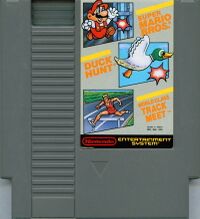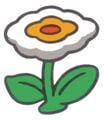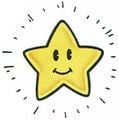Super Mario Bros.: Difference between revisions
m (→Gameplay) |
|||
| Line 48: | Line 48: | ||
''Super Mario Bros.'' is divided into eight worlds, which each have four levels. Mario has to get to the end of the level by jumping over various gaps and avoiding the enemies on his way. Mario can use several platforms, (which sometimes fall down when Mario hits them), stairs in the level, as well as [[Trampoline|Jumping Boards]]. There are also pipes along the way, some of which Mario can enter to visit various coin rooms before returning to the level, a bit further ahead than when he left. | ''Super Mario Bros.'' is divided into eight worlds, which each have four levels. Mario has to get to the end of the level by jumping over various gaps and avoiding the enemies on his way. Mario can use several platforms, (which sometimes fall down when Mario hits them), stairs in the level, as well as [[Trampoline|Jumping Boards]]. There are also pipes along the way, some of which Mario can enter to visit various coin rooms before returning to the level, a bit further ahead than when he left. | ||
Enemies include [[Goomba]]s, [[Koopa Troopa]]s, [[Buzzy Beetle]]s, [[Koopa Paratroopa]]s, [[Bullet Bill]]s, [[Hammer | Enemies include [[Goomba]]s, [[Koopa Troopa]]s, [[Buzzy Beetle]]s, [[Koopa Paratroopa]]s, [[Bullet Bill]]s, [[Hammer Bro.|Hammer Bro]]s., and jumping [[Cheep-Cheep]]s. All these enemies can be defeated when Mario jumps on them. Koopa Troopas and Buzzy Beetles will leave their shell on the ground, which Mario can kick to hit other enemies with. Koopa Paratroopas lose their wings and fall to the ground when Mario jumps on them. Other enemies include [[Piranha Plant]]s, the [[Spiny]]-throwing [[Lakitu]]s and the [[Hammer Bro.|Hammer Bros.]] These enemies are hard to defeat, and Mario has to avoid them. There are a few levels which are underwater. Underwater, Mario can swim freely from the top to the bottom of the screen. The enemies in underwater levels are [[Blooper|Bloobers]] and Cheep-Cheeps, and Mario has no way to defeat them aside from [[fireballs]]. | ||
If Mario takes a hit, falls down a pit, or if the [[time limit]] runs out, he loses a life, and starts again. The point where Mario continues depends on how far he ran through the level before dying; either from the very beginning, or at one of several invisible "checkpoints" throughout the level. | If Mario takes a hit, falls down a pit, or if the [[time limit]] runs out, he loses a life, and starts again. The point where Mario continues depends on how far he ran through the level before dying; either from the very beginning, or at one of several invisible "checkpoints" throughout the level. | ||
Revision as of 18:06, May 25, 2009
Template:Articleabout Template:Infobox Super Mario Bros. (known as Super Mario in Super Mario All-Stars, Japanese スーパーマリオブラザーズ Super Mario Brothers) is the semi-sequel to Mario Bros., a game which was released for the Famicom on September 13, 1985, and on the Nintendo Entertainment System in North America on October 18, 1985. This is the first game to be set explicitly in the Mushroom Kingdom, marking the first appearances of Bowser and Princess Toadstool, as well as Koopa Troopas, Goombas and many other Mario series enemies. Super Mario Bros. is the best selling video game of all time, and was largely responsible for the initial success of the Nintendo Entertainment System. As of 2003, the game has sold more than 40.23 million copies worldwide, making it the second best selling video game of all time.
Characters
- Mario (Playable)
- Luigi (Playable)
- Goomba (Enemy)
- Koopa Troopa (Enemy)
- Piranha Plant (Enemy)
- Koopa Paratroopa (Enemy)
- Firebar (Enemy)
- False Bowser (Boss)
- Mushroom Retainer (Non-Playable)
- Blooper (Enemy)
- Cheep-Cheep (Enemy)
- Podoboo (Enemy)
- Lakitu (Enemy)
- Spiny Egg (Enemy)
- Spiny (Enemy)
- Buzzy Beetle (Enemy)
- Bill Blaster (Enemy)
- Bullet Bill (Enemy)
- Hammer Bros. (Enemy)
- Bowser (Boss)
- Princess Toadstool (Non-Playable)
Story
One day, King Bowser Koopa, the great and powerful leader of the militaristic Koopa Troop, invades the peaceful Mushroom Kingdom. He and his Koopa Troop were jealous of the beautiful kingdom, and King Bowser decided to take it for himself. To do this, Bowser casts an evil spell upon the kingdom and transforms all of its inhabitants into blocks, weeds, and other odd objects. It is foretold that only the Mushroom King's daughter Princess Toadstool can undo the spell, so Bowser kidnaps her. Fortunately, the heroic Mario Bros. get wind of the Mushroom Kingdom's plight and race to its rescue.
The player takes the role of Mario, or in the case of a second player, Mario's brother Luigi. The ultimate objective is to race through the worlds of the Mushroom Kingdom, evade or eliminate Bowser's forces, and save the Princess.[1]
Gameplay
Super Mario Bros. is divided into eight worlds, which each have four levels. Mario has to get to the end of the level by jumping over various gaps and avoiding the enemies on his way. Mario can use several platforms, (which sometimes fall down when Mario hits them), stairs in the level, as well as Jumping Boards. There are also pipes along the way, some of which Mario can enter to visit various coin rooms before returning to the level, a bit further ahead than when he left.
Enemies include Goombas, Koopa Troopas, Buzzy Beetles, Koopa Paratroopas, Bullet Bills, Hammer Bros., and jumping Cheep-Cheeps. All these enemies can be defeated when Mario jumps on them. Koopa Troopas and Buzzy Beetles will leave their shell on the ground, which Mario can kick to hit other enemies with. Koopa Paratroopas lose their wings and fall to the ground when Mario jumps on them. Other enemies include Piranha Plants, the Spiny-throwing Lakitus and the Hammer Bros. These enemies are hard to defeat, and Mario has to avoid them. There are a few levels which are underwater. Underwater, Mario can swim freely from the top to the bottom of the screen. The enemies in underwater levels are Bloobers and Cheep-Cheeps, and Mario has no way to defeat them aside from fireballs.
If Mario takes a hit, falls down a pit, or if the time limit runs out, he loses a life, and starts again. The point where Mario continues depends on how far he ran through the level before dying; either from the very beginning, or at one of several invisible "checkpoints" throughout the level.
Mario can get special power-ups out of ? Blocks or, uncommonly, Brick Blocks. Most of the ? Blocks in which Mario can find these items are visible, but some are hidden and only become visible when Mario hits them from beneath. With the Super Mushroom, he turns into Super Mario. As Super Mario, he can survive the hit of an enemy one time, at the cost of turning back to Small Mario. Additionally, he can now get the Fire Flower. With the Fire Flower, Super Mario turns into Fire Mario, which allows him to shoot fireballs at enemies to defeat them from a distance. With the 1-Up Mushroom, he gets an additional life; he can also get an extra life if he collects 100 coins. With the Starman, which can only be found in Brick Blocks, Mario turns invincible for a short amount of time, and can defeat enemies by simply touching them.
At the end of each level, there is a castle with a flagpole nearby. When Mario his the flagpole, he takes down Bowser's flag and enters the castle, completing the level. The higher the spot is where Mario hits the flagpole, the more points he gets. If there are two players playing the game, Luigi's turn comes whenever Mario completes a level or dies. Luigi has no special abilities in the game that are different from Mario's.
The fourth level of each world plays inside a castle. They are usually filled with Firebars, and Podoboos may appear. At the end of a castle level, Mario is confronted with a False Bowser in Worlds 1 - 7 and the real Bowser in World 8. Mario ordinarily has no way to hurt Bowser, and has to either use the Ax to destroy the ground, causing the false Bowser or Bowser to fall into the lava, or pelt Bowser with a number of fireballs, which produces the same result and reveals the true forms of the fakes. After defeating a false Bowser, Mario frees several Toads from the castle. There is one Toad in World 1, two Toads in World 2, and so on. In World 8, Mario frees Princess Toadstool. If Mario frees Toads, they will say their signature sentence "Thank you, Mario! But our princess is in another castle...".
Modes
After beating the game, the player is given the option to start the game again in Hard Mode, where all Goombas are replaced by Buzzy Beetles, and all enemies walk faster; all of the elevator-style lifts are about sixty-percent of their original size, while firebars appear in all possible locations. However, the player still has the same amount of time to complete each level. The Mario Bros. gain no special powers in Hard Mode, and they receive no extra points when they defeat an enemy. The story remains exactly the same, as each of the first seven castles contain a Mushroom Retainer that needs rescuing, while the eight castle has Princess Toadstool. If the player finishes the game on hard mode, he or she will unlock nothing new from the previous time the game was finished.
List of Enemies
- Blooper
- Bowser
- Bullet Bill
- Buzzy Beetle
- Cheep Cheep
- False Bowser
- Firebar
- Goomba
- Hammer Bro.
- Koopa Paratroopa
- Koopa Troopa
- Lakitu
- Piranha Plant
- Podoboo
- Spiny
- Spiny Egg
List of Levels
| World | Level | Setting | Enemies found |
|---|---|---|---|
| World 1 | 1 | Ground | Goomba, Koopa Troopa |
| 2 | Underground | Goomba, Koopa Troopa, Piranha Plant | |
| 3 | Heights | Goomba, Koopa Troopa, Koopa Paratroopa | |
| 4 | Castle | Firebar, False Bowser | |
| World 2 | 1 | Ground | Goomba, Koopa Troopa, Koopa Paratroopa, Piranha Plant |
| 2 | Underwater | Bloober, Cheep-Cheep, Piranha Plant | |
| 3 | Seaside | Jumping Cheep-Cheep | |
| 4 | Castle | Firebar, Podoboo, False Bowser | |
| World 3 ★ | 1 | Ground | Goomba, Koopa Troopa, Koopa Paratroopa, Piranha Plant, Hammer Bro. |
| 2 | Ground | Goomba, Koopa Troopa, Koopa Paratroopa, Piranha Plant | |
| 3 | Heights | Goomba, Koopa Troopa, Koopa Paratroopa | |
| 4 | Castle | Firebar, Podoboo, False Bowser | |
| World 4 | 1 | Ground | Piranha Plant, Lakitu, Spiny |
| 2 | Underground | Goomba, Koopa Troopa, Piranha Plant, Buzzy Beetle | |
| 3 | Heights | Koopa Troopa, Koopa Paratroopa | |
| 4 | Castle | Piranha Plant, Podoboo, Firebar, False Bowser | |
| World 5 | 1 | Ground | Goomba, Koopa Troopa, Koopa Paratroopa, Piranha Plant, Bullet Bill |
| 2 | Ground/Underwater (secret) | Goomba, Koopa Troopa, Koopa Paratroopa, Piranha Plant, Buzzy Beetle, Bullet Bill, Hammer Bro. (Bloober, Cheep-Cheep) | |
| 3 | Heights | Goomba, Koopa Troopa, Koopa Paratroopa, Bullet Bill | |
| 4 | Castle | Podoboo, Firebar, False Bowser | |
| World 6 ★ | 1 | Ground | Piranha Plant, Lakitu, Spiny |
| 2 | Ground/Underwater (secret) | Goomba, Koopa Troopa,Koopa Paratroopa, Piranha Plant, Buzzy Beetle (Bloober, Cheep-Cheep) | |
| 3 | Heights | Bullet Bill | |
| 4 | Castle | Podoboo, Firebar, False Bowser | |
| World 7 | 1 | Ground | Koopa Troopa, Koopa Paratroopa, Piranha Plant, Buzzy Beetle, Hammer Bro., Bullet Bill |
| 2 | Underwater | Bloober, Cheep-Cheep, Piranha Plant | |
| 3 | Seaside | Jumping Cheep-Cheep, Koopa Troopa, Koopa Paratroopa | |
| 4 | Castle | Podoboo, Firebar, False Bowser | |
| World 8 | 1 | Ground | Goomba, Koopa Troopa, Koopa Paratroopa, Piranha Plant, Buzzy Beetle |
| 2 | Ground | Goomba, Koopa Paratroopa, Piranha Plant, Buzzy Beetle, Lakitu, Spiny, Bullet Bill | |
| 3 | Near the castle | Koopa Troopa, Koopa Paratroopa, Piranha Plant, Bullet Bill, Hammer Bro. | |
| 4 | Castle/Underwater | Goomba, Koopa Paratroopa, Piranha Plant, Firebar, Podoboo, Buzzy Beetle, Hammer Bro., Bloober, Cheep-Cheep, Bowser |
Glitches
- Main article: List of Glitches § Super Mario Bros.
Alternate Versions
- 1985 - Original release (US/Japan)
- (Year Unknown) - Ported into the American arcade machine, the Nintendo Playchoice-10.
- 1986 - Re-released on the Famicom Disk System in Japan.
- 1988 - Re-released on the NES in the US as part of the 2-in-1 Super Mario Bros./Duck Hunt compilation, packaged with the NES Action Set.
- 1990 - Re-released on the NES in the US as part of the 3-in-1 Super Mario Bros./Duck Hunt/World Class Track Meet compilation, packaged with the NES Power Set.
- 1993 - Remake available on the SNES as part of the Super Mario All-Stars compilation (known as Super Mario Collection in Japan). Graphics and sound were updated, and many glitches were removed.
- 1994 - Remake available on the SNES in the US as part of the Super Mario All-Stars + Super Mario World compilation, packaged with the SNES Mario Set.
- 1998 - Remake released on the Game Boy Color as Super Mario Bros. Deluxe. The game featured the original game's graphics but loads of additional content.
- 2001 - The original game is available as an unlockable NES game in Animal Crossing. Unfortunately, it can currently only be unlocked using an Action Replay cheat.
- 2004 - The original game was re-released on the Game Boy Advance as part of the NES Classics / Famicom Mini collection, celebrating 20 years of the Famicom in Japan.
- 2006 - Available on the Wii as part of the Virtual Console.
- 2008 - Available in Super Smash Bros. Brawl as a playable demo.
Official Artwork
- Mario SMB.png
- Super Mario Running Artwork.jpg
Mario running - SMB Goomba.jpg
- SMB KoopaParatroopa.jpg
- SMB BuzzyBeetle.jpg
- SMB Lakitu.jpg
- OriginalPiranha.jpg
- SMB BulletBill.jpg
- CheepCheepSMB.jpg
Trivia
- The Super Mario Bros. Stamps set was released in Japan at the end of May, 2007. The stamps feature sprites of characters and items from this game.
- This game was originally supposed to be updated and packaged with Super Mario Advance, which would mean its sequels would have had the same side game.
- Super Mario Advance 4: Super Mario Bros. 3 had Classic World 1-1, 1-2, 1-3, 1-4, and 2-2. Only World 1-1 was released outside Japan.Template:Refneeded
- The game's manual, the Super Mario Bros. Deluxe manual and the the virtual console page of this game say that koopas used black magic, although they don't use it in this or any other game, except Bowser in Paper Mario and Mario Party.
- There is an activity in the game Wii Fit Template:Refneeded where the player can occasionally spot 8-bit Mario stickers.
- In Super Smash Bros. Brawl, the stage Mushroomy Kingdom is based on worlds 1-1 and 1-2 of this game.
References
- ^ Super Mario Bros. game manual, page 2
Template:Super Mario Bros. Template:VirtualConsole





